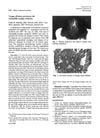Search
for
Sort by
Research
210-240 / 1000+ results
research Postfebrile Telogen Effluvium: Hair Fall After Rickettsia Conorii Infection
Hair loss can happen after a fever caused by Rickettsia conorii infection.

research The Role of the VEGF, KGF, EGF, and TGF-β1 Growth Factors in the Pathogenesis of Telogen Effluvium in Women
Certain growth factors significantly affect hair loss in women with telogen effluvium.

research Telogen Elongation in the Hair Cycle of ob/ob Mice
Obese mice with a leptin gene mutation have a longer resting phase in their hair cycle, which may help understand certain hair loss conditions.

research Telogen Effluvium Revisited: A 2014 Review
Hair loss in Telogen effluvium is often chronic, linked to stress, and lacks a confirmed treatment, but topical corticosteroids may be used.

research Telogen Effluvium After Oral Albendazole
A woman experienced temporary hair loss after taking albendazole, which resolved on its own within 3 months.

research Telogen Effluvium as a Clinical Presentation of Human Immunodeficiency Virus Infection
Hair loss can be an early sign of HIV infection.

research Telogen Effluvium Associated with Eosinophilia-Myalgia Syndrome
Hair loss in a woman with eosinophilia-myalgia syndrome improved after stopping L-tryptophan and starting treatment.

research Telogen Effluvium in SARS-CoV-2 Infection: Histological Aspects
COVID-19 can cause a temporary hair loss condition.

research Telogen Effluvium After COVID-19 Vaccination Among Public in Saudi Arabia
Some people in Saudi Arabia experienced hair loss after the COVID-19 vaccine, more often in women and those without prior hair loss.

research Covid Induced Telogen Effluvium: An Insight
COVID-19 may cause temporary hair loss due to direct damage to hair follicles, but it usually gets better on its own.

research The Role of Autologous Micrografts Injection from Scalp Tissue in the Treatment of COVID-19 Associated Telogen Effluvium: Clinical and Trichoscopic Evaluation
Injecting scalp tissue micrografts is a safe and effective treatment for hair loss after COVID-19.

research Evaluation of Patients with Telogen Effluvium During the Pandemic: Are Monocytes Responsible for Post COVID-19 Telogen Effluvium?
Monocytes might be linked to hair loss after COVID-19.

research Telogen Effluvium in the New SARS-CoV-2 Era
COVID-19 and related stress may increase hair loss known as Telogen effluvium.

research Telogen Effluvium: New Possibilities of Correction
Combining iron supplements with Qilib lotion is more effective for treating hair loss from iron deficiency.

research Localized Telogen Effluvium After Face Lift Surgery
A woman's temporary hair loss after face lift surgery stopped on its own, and hair grew back.
research A Potential Relation Between Telogen Effluvium and Iron Deficiency in Adult Females
Low iron levels are linked to hair loss in adult women.

research Letter: Telogen Effluvium Secondary to Starvation Diet
Starvation diets can cause significant hair loss.
research Hair Loss and Telogen Effluvium Related to COVID-19: The Potential Implication of Adipose-Derived Mesenchymal Stem Cells and Platelet-Rich Plasma as Regenerative Strategies
COVID-19 can cause hair loss, and treatments like PRP and stem cells might help.

research Complementary Strategies to Promote Hair Regrowth in Post-COVID-19 Telogen Effluvium
Different methods, including stress management, healthy diet, supplements, and treatments like minoxidil, can help hair grow back after COVID-19 related hair loss.

research Targeted Nutritional Supplementation for Telogen Effluvium: Multicenter Study on Efficacy of a Hydrolyzed Collagen, Vitamin, and Mineral-Based Induction and Maintenance Treatment
Special supplements with collagen, vitamins, and minerals can help treat hair loss.

research Thymosin β4 Identified by Transcriptomic Analysis from Hair Follicle Anagen to Telogen Promotes Proliferation of Secondary Hair Follicle Dermal Papilla Cells in Albas Cashmere Goat
Thymosin β4 helps increase hair growth in Cashmere goats.

research Analysis of Microscopic Examination of Pulled Out Hair in Telogen Effluvium Patients
More atypical club hairs may indicate Telogen Effluvium.

research Miliacin Encapsulated by Polar Lipids Stimulates Cell Proliferation in Hair Bulb and Improves Telogen Effluvium in Women
Miliacin with polar lipids helps hair growth and improves hair loss in women.

research Alopecia in Cronkhite-Canada Syndrome: Is It Truly Telogen Effluvium?
Hair loss in Cronkhite-Canada syndrome may be caused by autoimmune factors, not just stress or malabsorption.
research Retrospective Evaluation of Laboratory Data of Patients with Telogen Effluvium
The conclusion cannot be provided because the document content is not available.

research Research on the Balance of Thiol-Disulfide in Blood Serum in Women with Telogen Effluvium
The balance of thiol-disulfide in women with hair loss is affected but not damaged.

research Telogen Effluvium With Dysesthesia Has Lower B12 Levels and May Respond to B12 Supplementation
People with TED often have low B12 levels and might benefit from B12 supplements.

research Telogen Effluvium as First Clinical Presentation of Dengue
Hair loss might be the first sign of dengue fever.

research Low Iron Level Is Related to Telogen Effluvium in Women: A Case-Control Study
Low iron levels are linked to hair loss in women.